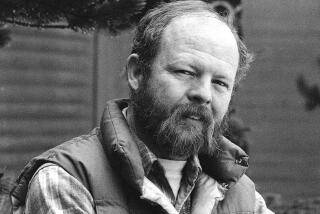Seymour Melman, 86; Columbia Professor Favored Disarmament
- Share via
Seymour Melman, a Columbia University professor who fueled the antiwar movement with economic studies showing how the high cost of military involvement short-changed domestic needs such as roads, schools and housing, has died. He was 86.
Melman died Thursday at his New York City home of an apparent aneurysm.
A staunch advocate of what he called “economic conversion,” Melman co-wrote proposed legislation to require “alternative use” planning in military industries, labs and bases to ease the transition to civilian production.
He also tweaked public opinion about “re-industrializing” America to make it less dependent on imported goods and to reinvigorate what he saw as a stagnating economy.
Melman supported disarmament and opposed nuclear weapons for 50 years and had long disputed the idea that World War II pulled the United States out of the Great Depression. He was against the current war in Iraq.
“It’s a myth that military spending brings prosperity to all,” he told the Washington Post in 1990 as the Cold War ended and the Gulf War loomed. “Industrial and infrastructure decay are the threat to U.S. national security.”
Melman was merely restating what he had been saying for decades. To emphasize the point that military spending should be directed to needs closer to home, he added: “There are more beggars on Broadway now than during the Great Depression.... We are in a terrible situation.”
The retired professor of industrial engineering was a prolific speaker and writer of articles, essays and books. He popularized such words as “overkill” to describe the stockpiling of nuclear weapons and proposed jolting trade-offs in government spending, such as scrapping the $4-billion to $5-billion C-5A aircraft program to eliminate hunger in the United States.
His clear opinions had broad appeal, helping to unify antiwar, peace and public advocacy groups while providing rallying cries for organized labor.
Melman’s books include “Our Depleted Society” (1965), “Pentagon Capitalism” (1970), “Permanent War Economy” (1984), “Profits Without Production” (1988), “Demilitarized Society” (1990) and “After Capitalism: From Managerialism to Workplace Democracy” (2001).
He served as chairman of the National Commission for Economic Conversion and Disarmament and co-chairman of the Committee for a Sane Nuclear Policy.
“Seymour Melman’s studies on the adverse impact of the large U.S. permanent war budget on the civilian economy were prescient for decades,” consumer activist Ralph Nader said in a statement Friday. “He documented the drain on our economic well-being by what Eisenhower called ‘the military-industrial complex.’ He was an industrial engineer and economist as if people mattered -- a rare and humane person.”
Richard F. Kaufman, a reviewer quoted in the anthology Contemporary Authors, had earlier praised Melman’s insight into the consequences of directing resources to military production.
“Seymour Melman was one of the first to see the futility of the policy of guns and butter, and he had the courage to write and speak against it long before it became fashionable to do so,” Kaufman wrote.
In the preface to his book by the same name, Melman described the so-called depleted society as “an economic audit of the price that America has paid for 20 years of cold war.”
Born Dec. 30, 1917, in New York City, Melman was educated at the City College of New York and Columbia, served as a first lieutenant in the Army artillery during World War II and spent his entire career teaching at Columbia and writing.
Divorced, he is survived by a brother, Myron, of Rehovot, Israel.
More to Read
Sign up for Essential California
The most important California stories and recommendations in your inbox every morning.
You may occasionally receive promotional content from the Los Angeles Times.








